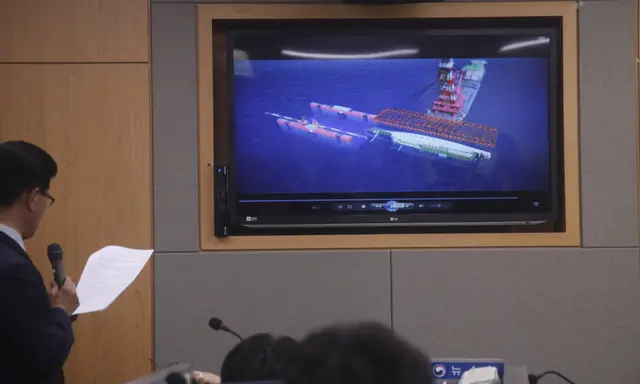The bereaved families who lost their loved ones in one of South Korea's deadliest maritime disaster seemed at a first glance to have returned to their normal life, smilingly having a chat with each other before press conference to foreign correspondents in Seoul earlier this week.
The conference was held ahead of the second anniversary on Saturday of the passenger ferry-sinking tragedy that claimed hundreds of lives, mostly high school students on their school trip to the country's southern resort island of Jeju.
Nationwide memorial ceremonies, which started from Friday night, would continue later in the day, including the reading of memorial poems, the performing of memorial music and the origami event to fold yellow paper boats.
Two years ago, the 6,825-ton ferry Sewol capsized and sank off the country's southwest coast, leaving 304 passengers dead.
Bodies of nine people, who are still unaccounted for, are believed to have been trapped inside the sunken vessel.
Two fathers and a mother, who lost their precious children in the sinking, failed to hide their grim faces during the press conference.
However, they seemed no longer to stay in abysmal sorrow, speaking in a resolute and solemn tone about what they have been fighting for.
"I miss my daughter far more in spring when cherry blossoms bloom. It's probably because it happened in April," said Yoo Gyoung-Geun, father of Yae-Eun, one of Danwon High School students who were killed in the country's deadliest peacetime disaster.
Yoo is the executive director for the April 16 Families for Truth and a Safer Society, an association representing bereaved families of the victims.
He still lives in agony. When he misses her daughter so much, Yoo said, he sometimes wishes he could not open his eyes in the morning to follow his daughter to the grave.
However, he said he cannot even kill himself because truth behind the disaster hasn't been revealed. Yoo asked journalists to focus on what the bereaved families have been fighting for, instead of reporting on the still ongoing grief and pain. Gaining sympathy was not included in his wish list.
What the bereaved families desperately wanted was clear, truth.
They believed that getting down to bedrock would be a starting point to figure out what went wrong in the society, hoping it could eventually help South Korea become a safer society that would prevent recurrence of such tragedies and make the deaths of their loved ones all worthwhile.
Prosecutors picked an illegal overloading, an extended remodeling of the vessel and an abrupt turn as main reasons for the sinking, but the families claimed those were not enough to explain why the ferry went under so quickly.
The families wondered why the government sat idle and did nothing in an initial phase for 90 minutes before the ship sank completely.
They also wondered why coast guards failed to make aggressive rescue efforts from the very beginning and why sailors ordered passengers by a whopping 12 times to stay as they were.
To find answers to those seemingly simple, but realistically very complicated, questions, a thorough investigation should be guaranteed "without any sanctuary permitted," the families said, but it was obstructed by what they claimed was a systematic, organized sabotage by the government and ruling party lawmakers.
President Park Geun-hye's conservative Saenuri Party suffered a shocking defeat in the general election on Wednesday, losing a majority as it just won 122 seats in the 300-member National Assembly. The main opposition Minjoo Party took 123 seats, with the newly created People's Party securing 38 seats.
Budget for the Special Investigation Committee (SIC) tasked with independently probing into the Sewol ferry disaster was offered only in August 2015, so the investigation kicked off in September.
The delayed budget supply almost halved the investigation period from 18 to 10 months as its authority expires in June.
The Ministry of Oceans and Fisheries said the salvage of the sunken ship would be completed in July, indicating an exclusion of the committee from an investigation into the recovered vessel, which the families of the victims portrayed as a key evidence to figure out what happened two years ago.
"It is rumored that the Sewol ferry may not be lifted from under the waters forever. But, I'll try to believe what the oceans and fisheries ministry announced until July," said Jung Seong-Wook, who lost his son Dong-Soo at the disaster, expressing his distrust of the ministry's salvage plan.
The families also talked about other abnormalities. Budget in 2016 for the special committee was cut to one-third of what was initially proposed, and the salvage process was not completely made open to them.
What was worse was that potential victims haven't been protected or treated properly. Excluded from the government's compensations were irregular teachers who passed away while saving students, along with civilian divers, volunteer workers and fishermen who still live in the Jindo Island.
Temporary and limited medical assistance has been provided for surviving teachers and students to treat their psychological trauma, the families said.
Some of the students had attempted to commit suicide on a sense of guilt that they only survived.
"Two years have passed, but what the bereaved families demanded hasn't been accepted yet. It deepened traumatic symptoms especially among parents," said Hong Young-Mi who lost his son Lee Jae-Wook.
She is head of the family association's psychological and livelihood support team.
According to Hong, a total of about 1,000 victims and the bereaved families were traumatized by the disaster. Some of them overcame it more or less thanks to psychological treatment, but others were still suffering from painful memories.
Some parents had difficulties in controlling anger and feelings as every effort to uncover truth behind the disaster were blocked.
Some of parents cooped themselves up inside a house, accepting no approach from others, including psychotherapists.
 简体中文
简体中文

